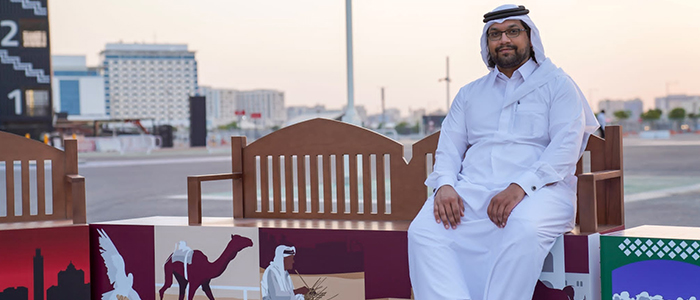Several Qatar-based artists contributed to the design of ‘Friendship Benches’ that were recently launched ahead of the upcoming FIFA World Cup Qatar 2022™. One of the participating artists is Faras Almeer – the Health Policy Research Officer at the World Innovation Summit for Health (WISH).
The Friendship Bench project is made up of 32 separate benches that are now installed around the FIFA World Cup™ stadiums. Each bench represents one of the national teams competing in the tournament and aims to encourage and promote the discussion around mental health. The project is a collaboration between the World Health Organization (WHO), the Ministry of Public Health (MoPH), the Supreme Committee for Delivery and Legacy (SC), WISH and FIFA.



WISH took the lead in creating designs for the 32 benches and having worked as a freelance artist, Almeer spearheaded the project. His unique style uses bold and saturated colours, as well as country-specific iconography. He also worked with a group of patients in recovery at Naufar – a local rehabilitation centre for substance abuse and addiction – and Virginia Commonwealth University School of the Arts in Qatar (VCUarts Qatar) alumna and multidisciplinary artist Nada Abbara, on the bench designs.
Transcending boundaries
According to Almeer, mental illness does not discriminate based on age, gender or nationality, and art is a powerful medium that transcends boundaries and allows people to communicate across borders, languages and cultural differences.

So it is only fitting that we use the medium of art to address the issue of social and cultural stigma associated with mental health disorders. I believe that designing friendship benches combines the power of artistic expression with fostering open conversations for mental well-being.
Having designed the benches representing Australia, South Korea, Japan, Netherlands and Denmark, patients at Naufar appreciated the opportunity to express their own experiences. One of the patients said that substance abuse is a mental health disorder and a serious health condition, and those who suffer from it are already riddled with guilt. Therefore, he said it is imperative to eradicate societal stigmas and shame so that those with mental illnesses and their families can seek the necessary help.
Being a part of this project gave us the chance to contribute towards a significant initiative so that we can share our experiences through art to inspire and support those who are suffering in silence and encourage them to seek help.
Abbara, meanwhile, strongly believes that mental well-being can be improved in societies. She said that physical ways of communication are vital because we have been deprived of human connection in recent years. Interestingly, she shared that the notion of the bench is not novel because you realise that each one of us has, at some point, sat down to talk and connect with family or friends. A friendship bench is indeed a healing bench.
Abbara has designed the benches representing countries that include Canada, Brazil and Uruguay, and her designs embody the culture, landmarks and architecture of each country, taking into consideration the history of those landmarks and what they represent today.
Global Friendship Bench project
The global Friendship Bench project, adopted by the WHO, is an evidence-based intervention, first developed in Zimbabwe, to bridge the mental health treatment gap. The project aims to enhance mental well-being and improve quality of life through the use of accessible, problem-solving therapy.
WISH is a global health initiative of Qatar Foundation. For more information, visit wish.org.qa.
Check out Marhaba’s FREE e-Guides for everything you need to know about Qatar.








